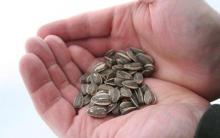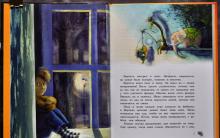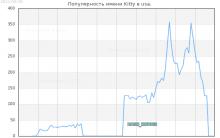The Russian language is one of the most complex and rich languages in the world. It has a long history of development. However, like Russia itself.
Language is not a random collection of letters and words. It represents a system. We see the richness of the Russian language at all its levels, from sounds to complex sentences and entire texts. For example, in Russian, one of the few languages, there is a division of verbs into persons. This is not found in English and many other languages of the world.
The vocabulary of the Russian language contains enormous wealth. There are many words in it to denote not only feelings or actions, but even their shades.
A SELECTION OF THE MOST INTERESTING FACTS ABOUT THE RUSSIAN LANGUAGE
Most words with the letter F in Russian are borrowed. Pushkin was proud that in “The Tale of Tsar Saltan” there was only one word with this letter - fleet.
There are only 74 words in the Russian language that begin with the letter Y. But most of us only remember iodine, yoga and Yoshkar-Ola.
There are words starting with Y in the Russian language. These are the names of Russian cities and rivers: Ygyatta, Yllymakh, Ynakhsyt, Ynykchansky, Ytyk-kyyol.
The only words in the Russian language with three letters E in a row are long-necked (and others on the neck: for example, crooked-, short-).
In the Russian language there is a word with a unique prefix “ko” - nook.
The only word in the Russian language that does not have a root is take out. It is believed that this word contains the so-called zero root, which alternates with the root -im- (take out-im-at). Previously, until about the 17th century, this verb looked like take out, and it had a material root, the same as in remove, embrace, understand (cf. remove, embrace, understand), but later the root -nya- was reinterpreted as the suffix - well- (as in stick, blow).
The only one-syllable adjective in the Russian language is angry.
In the Russian language there are words with prefixes unique to the language and- (total, total) and a- (maybe; obsolete “and you won’t be lucky”), formed from the conjunctions “and” and “a”.
The words bull and bee have the same root. In the works of ancient Russian literature, the word bee was written as bchela. The alternation of vowels ъ/ы is explained by the origin of both sounds from the same Indo-European sound u. If we recall the dialect verb buchat’, which has the meaning of “roar”, “buzz”, “buzz” and is etymologically related to the words bee, bug and bull, then it becomes clear what the general meaning of these words was.
Dahl proposed replacing the foreign word atmosphere with the Russian words kolozemitsa or mirokolitsa.
Until the 14th century in Rus', all indecent words were called “absurd verbs.”
In the 1993 Guinness Book of Records, the longest word in the Russian language was named X-ray electrocardiographic; in the 2003 edition, it was named “excessively considerate.”
In the Grammar Dictionary of the Russian Language by A. A. Zaliznyak, 2003 edition, the longest (in letters) common noun lexeme in dictionary form is the adjective private entrepreneur. Consists of 25 letters.
The longest verbs are to re-examine, to substantiate and to internationalize (all - 24 letters; the word forms -уусиямїї and -вісті - 25 letters each).
The longest nouns are misanthropy and eminence (24 letters each; word forms -ami - 26 letters each, however, misanthropy is practically not used in the plural).
The longest animate nouns are eleventh-grader and clerk (21 letters each, word forms -ami - 23 letters each).
The longest adverb recorded by the dictionary is unsatisfactory (19 letters). However, it must be taken into account that the overwhelming majority of qualitative adjectives in -й / -й are formed into adverbs in -о / -е, which are not always recorded in the dictionary.
The longest interjection included in the Grammar Dictionary is fizkult-hello (13 or 14 letters depending on the status of the hyphen).
The word is accordingly the longest preposition. It consists of 14 letters. The longest particle is exclusively one letter shorter.
In Russian there are so-called insufficient verbs. Sometimes a verb does not have any form, and this is due to the laws of euphony. For example: win. He will win, you will win, I... will win? Shall I run? will I win? Philologists suggest using replacement constructions “I will win” or “I will become a winner.” Since there is no 1st person singular form, the verb is "insufficient".
To successfully master the difficult phrase “I love you,” the British use the mnemonic “yellow-blue bus.”
And yet, yes - in the Russian language there is a word with six consonant letters in a row, and even with only one vowel - vzbzdnil.
— 20 interesting facts about the Russian language
— 23 interesting facts about the great and mighty
— 4 interesting facts about the Russian language
1) Most words with the letter F in Russian are borrowed. Pushkin was proud that in “The Tale of Tsar Saltan” there was only one word with this letter - fleet.
2) There are only 74 words in the Russian language that begin with the letter Y. But most of us only remember iodine, yoga and Yoshkar-Ola.
3) In Russian there are words starting with Y. These are the names of Russian cities and rivers: Ygyatta, Yllymakh, Ynakhsyt, Ynykchansky, Ytyk-kyyol.
4) The only words in the Russian language with three letters E in a row are long-necked (and others in -neck: for example, crooked-, short-).
5) In the Russian language there is a word with a unique prefix for the language - ko- - nook.
6) The only word in the Russian language that does not have a root is take out. It is believed that this word contains the so-called zero root, which alternates with the root -im- (take out-im-at). Previously, until about the 17th century, this verb looked like take out, and it had a material root, the same as in remove, embrace, understand (cf. remove, embrace, understand), but later the root -nya- was reinterpreted as the suffix - well- (as in stick, blow).
7) The only one-syllable adjective in the Russian language is evil.
8) In the Russian language there are words with prefixes unique to the language and- (total, total) and a- (maybe; obsolete “and you won’t be lucky”), formed from the conjunctions and and a.
9) The words bull and bee have the same root. In the works of ancient Russian literature, the word bee was written as bchela. The alternation of vowels ъ/ы is explained by the origin of both sounds from the same Indo-European sound u. If we recall the dialect verb buchat’, which has the meaning of “roar”, “buzz”, “buzz” and is etymologically related to the words bee, bug and bull, then it becomes clear what the general meaning of these words was.
10) Dahl proposed replacing the foreign word atmosphere with the Russian words kolozemitsa or mirokolitsa.
11) Until the 14th century in Rus', all indecent words were called “absurd verbs.”
12) In the 1993 Guinness Book of Records, the longest word in the Russian language is called X-ray electrocardiographic, in the 2003 edition it is called “excessively considerate”.
13) In the Grammar Dictionary of the Russian Language by A. A. Zaliznyak, 2003 edition, the longest (in letters) common noun lexeme in dictionary form is the adjective private entrepreneur. Consists of 25 letters.
14) The longest verbs are to re-examine, to substantiate and to internationalize (all - 24 letters; word forms - uyuschimi and - having - 25 letters each).
15) The longest nouns are misanthropy and eminence (24 letters each; word forms -ami - 26 letters each, however, misanthropy is practically not used in the plural).
16) The longest animate nouns are eleventh-grader and clerk (21 letters each, word forms -ami - 23 letters each).
17) The longest adverb recorded in the dictionary is unsatisfactory (19 letters). However, it must be taken into account that the overwhelming majority of qualitative adjectives in -й / -й are formed into adverbs in -о / -е, which are not always recorded in the dictionary.
18) The longest interjection included in the Grammar Dictionary is fizkult-hello (15 or 14 letters depending on the status of the hyphen).
19) The word is accordingly the longest preposition. It consists of 14 letters. The longest particle is exclusively one letter shorter.
20) In Russian there are so-called insufficient verbs. Sometimes a verb does not have any form, and this is due to the laws of euphony. For example: win. He will win, you will win, I... will win? Shall I run? will I win? Philologists suggest using the replacement constructions “I will win” or “I will become a winner.” Since there is no 1st person singular form, the verb is "insufficient".
1) A huge number of words in the Russian language that have the letter F were borrowed from other languages.
2) Only 74 words in the Russian language begin with the letter Y.
3) In the Russian language there are words that begin with the letter Y. Interesting facts about the Russian language say that these are the names of some rivers and cities.
4) The length of Russian words can be unlimited.
5) Not all Russian speakers today use words correctly.
6) The Russian language is considered one of the richest and most complex languages in the world.
7) The Russian language is expressive and rich.
9) Facts about the Russian language indicate that this language has become the 4th most translated language.
10) Russian is considered one of the 6 official languages of the UN. 11. The Russian language has words in which there are 3 letters e in a row. These are snake-eater and long-necked.
11) There are practically no original Russian words in the language that begin with the letter A.
12) In order to remember the Russian phrase “I love you”, the British use the phrase “Yellow-blue bus”.
13) The Russian language in the world is classified as an Indo-European language.
14) Approximately 200 million people use Russian in their speech. Interesting facts about the Russian language for children speak about this.
15) The Russian language is considered difficult to learn.
16) The longest interjection in the Russian language is considered to be the words “fizkult-hello”.
17) The plural verb “to be” is not used in Russian. This is evidenced by interesting facts about the verb.
18) Despite the fact that only 6 cases in the Russian language are studied according to the school curriculum, there are actually 10 of them.
19) The word "cucumber", which is widely used in Russian, is borrowed from Greek.
20) The word from the Russian language “doctor” comes from the word “to lie”, but in old times the meaning of this word was different.
21) There are no restrictions on the number of prefixes in the Russian language.
22) The alphabet of the Russian language is similar to Latin.
23) The longest particle in the Russian language is the word “exclusively”.
1) We learned the Russian language from all historical disasters.
Konstantin Paustovsky is a hundred times right when he wrote: “You can do miracles with the Russian language. There is nothing in life and in our consciousness that cannot be conveyed in Russian words. There are no sounds, colors, images and thoughts - complex and simple - for which there would not be an exact expression in our language.”
2) One coffee.
Since 2009, according to the order of the Ministry of Education, coffee has become a neuter type. It turns out that both usage options are acceptable. The logic of the decision was as follows. The word kofi is feminine, kofiy is masculine, and coffee is neuter.
3) Where are the standards? The business of society is to be attentive to native speech and support its standards.
It was once believed that the most correct speech came from central radio and television announcers. There were rumors that for mistakes in speech they would be deprived of bonuses and even deducted from their salaries. It would be nice to return to the traditions of the past, since today’s “talking heads” allow themselves a very free attitude towards the Russian language. Basically, the problem is with the accents: leisure, catalogue, VYSOKO, pozvoNish and stuff like that. \
4) A task for experts.
In one old club game “What? Where? When?" experts were asked about the true meaning of the title of Leo Tolstoy’s novel “War and Peace.” The experts answered correctly. Try it too. And below is a hint.
In the title of the novel, the word world is used as an antonym to war (pre-revolutionary “mir”), and not in the meaning of “the world around us” (pre-revolutionary “mir”). All lifetime editions of the novel were published under the title “War and Peace,” and Tolstoy himself wrote the title of the novel in French as “La guerre et la paix.” However, due to typos in different editions at different times, where the word was written as “mir”, debate about the true meaning of the novel’s title still continues.
The material was prepared by Dilyara specifically for the site
The Russian language is one of the most complex and amazing languages on our planet. Its history and development are long, just like the history of our state. Did you know that there are 74 words in our language that begin with “Y”? And in the Guinness Book of Records there is a word consisting of 35 letters. People never cease to be amazed at the richness and complexity of the Russian language. We present to your attention interesting facts about the Russian language for wall newspapers.
From the names of flowers
Poets have written a huge number of poems about flowers. It is difficult to choose a favorite flower, because there are many of them and each is beautiful in its own way. However, each of us has tried to make a bouquet at least once in our lives. Let's try to find out where the name of our favorite flowers came from in our language.
Let's start with the word "bouquet", which is of French origin. Each plant has its own meaning. Thus, during the reign of Empress Catherine the Great, there was a registry about flowers, thanks to which people knew that red bouquets spoke of love, and yellow ones - of betrayal. Arrangements of blue flowers were given as a sign of recognition of fidelity. However, we are not interested in the language of flowers, but in their names.
Let's talk about gladiolus. The name of this flower sounds solemn and even courageous. It is directly related to gladiators. After all, “gladiolus” translated from Latin means “sword”.
And people call it “sword” because the leaves of the flower are long and sharp, like a real sword. Did you know that “aster” translated from ancient Greek means star? The ancient Greeks gave the flower this name because it has sharp petals. They make the aster look exactly like a star. These people believed that the aster could communicate with the stars.

And we continue to consider interesting facts about the Russian language. Let's move on to the beautiful iris flower. And it is also of Greek origin. The Greeks used the word “Iris” to describe the rainbow.
But let’s leave the ancient Greeks alone and talk about the dahlia flower. It turns out that it was named after the St. Petersburg professor, ethnographer and traveler Georgi Gottlieb.
Now you can not only compose and give a beautiful bouquet, but also briefly tell interesting facts about the Russian language and flowers!
"Yellow and Blue Bus"
Do you know how the British remember the reverent phrase “I love you”? You've never heard anything like this before. In order to successfully master a difficult phrase - a declaration of love, they use a mnemonic made up of three English words: “yellow-blue bus”. Our list of interesting facts about the Russian language does not end here. And we continue to surprise you again and again.
Are you coming with us to the forest to “break your lips”?
This is exactly how people in some rural areas of our state were invited to pick mushrooms. The thing is that our ancestors used to call mushrooms also lips. Philologists explained this phenomenon this way: the mushroom comes from the ancient Slavic word for “hump.” And humps were called boletus, boletus and other mushrooms whose cap looked like a hump. Saffron milk caps and milk mushrooms were called lips, since their caps resembled lips. So in V.I. Dahl’s dictionary you can find the phrase “break your lips,” which means the modern phenomenon of “picking mushrooms.” But in the Urals and in the outback of Siberia, a soup made from such mushrooms is called nothing more than “gubnitsa”.

“By the ruble” or “I’ll chop”?
We continue to share with you interesting facts about the Russian language. This time we'll talk about money. What do you think is the origin of the proud word “ruble”? The head of the numismatics department of the Historical Museum in Moscow, Igor Shiryakov, advised us on this issue. He shared that no one still knows the true origin of the word “ruble”! For a long time it was believed that medieval ingots, cut in half, yielded two rubles. And then the Russian people realized that half is “polt”, which gave the name “poltina”. Then the ruble began to be called a whole ingot. For example, in the 14th century, a ruble ingot could buy 200 squirrel skins at once, and four centuries later, for 1 ruble you could buy 27 kilograms of fish and even meat. The interesting facts about the Russian language for the wall newspaper do not end there. And you and I move further through the expanses of our native language.

Word without root
When we were in elementary school, our first teacher told us that every word has a root, and words that have the same roots are called related. But no matter how it is! There is still one word in our native language that does not correspond to this reality! The word “take out” turns out to have no root. Linguists believe that it contains a zero root, which alternates with the root /im/ in the word “take out/im/at”. In the 17th century, our ancestors said “take out” and it had a material root, the same as in the words “take off”, “understand”, “embrace” and others. But a little later, the root /nya/ was rethought into the suffix /nu/, as in the case of the words “shove”, “blow”. These are some educational and interesting facts about the Russian language for wall newspapers.
Break the stereotype about the letter
Yes, yes, that’s exactly what we’ll try to do now! You can name a few words starting with “Y” without difficulty. However, as mentioned above, there are at least 74 of them in the Russian language. But can you remember at least one word starting with the letter “Y”? Perhaps such a task will baffle even the most well-read person. But since we are talking about this, the “Dictionary of Geographical Names of the Russian Federation” will come to our aid. It is in this book that you can find words starting with the letter that interests us. All of them represent the names of domestic rivers and cities. Get ready to listen: Ygyatta, Ynakhsyt, Ytyk-kyuel and other equally strange names.
Is physician Guillaume Guillotin really that outstanding?
We bring to your attention another interesting fact about the Russian language for wall newspapers. If you are asked: have you heard anything about the French doctor Guillaume Guillotin? Of course, you will refuse. However, this is not the case. And here's the thing! This man, as he grew older, trained to be a doctor. He had a boundless love for medicine, and therefore wanted to gain world fame and recognition. Whether he became an outstanding doctor is up to each of us to decide. If you think that the death penalty weapon guillotine and the surname Guillotin are ironically consonant, then you are greatly mistaken.

The Frenchman Guillotin felt sorry for the criminals sentenced to death. Therefore, he invented a weapon that cuts off the head, and, according to Guillotin, painlessly sends the soul of the criminal to another world. Whether Guillaume Guillotin is so talented as a doctor is something everyone decides for himself.
Finally
Our article ends. We, as promised, told you interesting facts about the Russian language for the wall newspaper. We hope that the interesting material we collected was useful to you.
Could you tell us a little more about our language?
But we use what we have. So, we bring to your attention the most interesting facts about the Russian language.


An interesting fact is that the only word in the Russian language that does not have a root is the word “take out”. It is believed that in this word the so-called zero root, which alternates with the root -im- (take out-im-at).
Previously, until about the 18th century, this verb looked like take out, and it had a material root, the same as in take off, hug, understand(cf. shoot, hug, understand).
However, the root -nya- was subsequently reinterpreted as the suffix -nu- (as in put, blow).



Another unusual and interesting fact about the Russian language. The words “bull” and “bee” have the same root. Yes, yes, don't faint!
In the works of ancient Russian literature, the word bee was written as “bychela”. The alternation of vowels ъ/ы is explained by the origin of both sounds from the same Indo-European sound u.
If you remember the dialect verb rumble, having the meaning of “roar”, “buzz”, “buzz” and is etymologically related to the words bee, bug and bull, it becomes clear what the general meaning of these words was.



Another interesting fact about the Russian language that you probably didn’t know. The longest nouns are “misanthropy” and “excellency” (24 letters each; word forms - 26 letters each).



Did you know that the longest adverb recorded in the Russian language dictionary is “unsatisfactory” (19 letters). Although it should be taken into account that the vast majority of qualitative adjectives in -й/-й are formed into adverbs in -о/-е, which are not always recorded in the dictionary.



And this is a very necessary and interesting fact. Experts in the Russian language probably already know it. In Russian there are so-called insufficient verbs.
Sometimes a verb does not have any form, and this is due to the laws of euphony. For example, the word “win”:
- he will win
- you will win,
- I... – will I win? Shall I run? will I win?
Philologists suggest using the replacement constructions “I will win” or “I will become a winner.”
Since there is no 1st person singular form, the verb is "insufficient".



Now you know quite a few interesting facts about the great and mighty Russian language. If you have any questions, you can ask them in the comments.
We hope that our selection was useful to you.
If you liked interesting facts about the Russian language, share the post on social networks.
If you like it at all, subscribe to the site in any convenient way. It's always interesting with us!
Russian is the ancestor of many other languages, but at the same time it is considered one of the most difficult to learn. He is truly beautiful and to be convinced of this, it is enough to read the works of outstanding writers such as Chekhov, Pushkin, Lermontov, Tolstoy and many others. Many literary experts believe that if these authors wrote their works in English, German, French or any other language, the result would be completely opposite. And it’s hard to disagree with this.
We present to your attention some very important things about the Russian language.
1. We all know very well that the Old Russian alphabet was different from the modern one. Most of the letters in it have retained their original appearance to this day, but their sound has changed. So, for example, the letter “X” sounded like “Her”.
2. A very large number of Russian words cannot be translated into foreign languages. One such example is the word “hangover.”
3. Have you at least once come across words in the Russian language that contain three letters “E”? And they exist - these are the “snake eater” and the “long-necked”.
5. Do you still think that there are no words in the Russian language that are written with a capital letter “Y”? And they are, and these are the names of settlements and rivers, namely Yllymakh, Ygyatta, Ynakhsyt, Ynykchansky, Ytyk-kyyol.
6. All cosmonauts, without exception, are required to learn Russian, since the ISS contains some names made in our native language.

7. “Excellency” is the longest noun in the Russian language, which consists of 24 letters. There is also another unusual word in the Russian language, “take out” - its peculiarity is that it is the only one of its kind, without a root.
8. Most words that begin with the letters “F” and “A” are borrowed from foreign languages. This was also emphasized by the outstanding Russian writer Alexander Sergeevich Pushkin - he was proud that in “The Tale of Tsar Saltan” there is only one word, the capital letter of which is “F” - the word “fleet”.
9. The word “zakoulok” is also unique to the Russian language - it has the prefix “KO”, which is absent from any other Russian word. Also in the Russian language there is another very interesting word “vzbdnul” - after reading it, you noticed that it has six consonants in a row.
10. In Ancient Rus', before the 14th century, indecent words were called “ridiculous verbs,” and there were many of them then and now.
11. About 7 billion people live in the world, and 200 million of them speak Russian. It is also worth noting that linguists classified the Russian language as an Indo-European language. It is one of the four most advanced languages in the world and is also one of the six official languages of the UN.
12. Another interesting fact from the history of the Russian language: it is believed that the writer Karamzin is the “parent” of the letter “Y”.

13. The word “exclusively” is considered the longest particle in the Russian language. But the leader in terms of length between interjections is the word “physical education-hello”.
14. World-renowned linguists note that the Russian language is considered one of the most difficult. Foreigners spend a lot of time studying it, especially when it comes to writing.
15. The most interesting fact about verbs: the word “to be” is not used in the plural.
16. In the Russian language you can use an infinite number of prefixes.











The benefits of sunflower seeds for the heart, hair and nerves
Why do my legs give way at the knees?
Name energy: how the patronymic influences fate and the birth program Name patronymic meaning character
First Chinese Emperor
Alfred the Great: biography